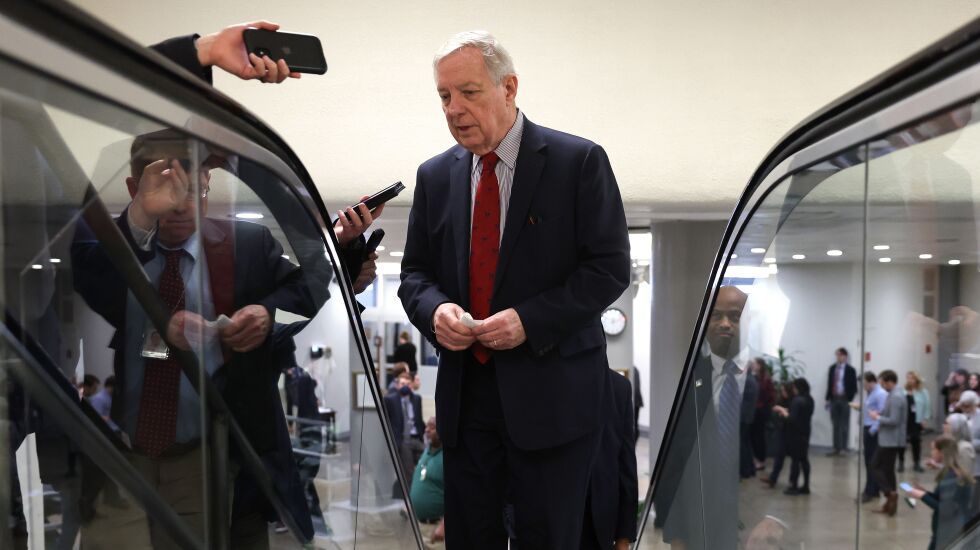
WASHINGTON — It’s understandable why there are a growing number of protesters calling for a cease-fire in Gaza, in Chicago and around the globe as the horrible humanitarian crisis grows each day.
In Chicago, cease-fire protesters have been targeting Sen. Dick Durbin, D-Ill., staging demonstrations outside his Chicago North Side high-rise home. He’s even come outside his building to talk to them. He’s not hiding.
What is puzzling from a tactical and political perspective is why the protesters calling for a cease-fire are aiming at Durbin, an ally in the cease-fire cause.
This bears repeating: Are protesters aware that on Nov. 2 Durbin was the first senator to call for a cease-fire?
During a CNN interview that day, host Poppy Harlow reminded Durbin that in 2021, during escalation of violence between Israel and Gaza, Durbin called for a cease-fire.
Harlow asked Durbin, “Is a cease-fire needed now?”
Replied Durbin, “I think it is. At least under — in the context of both sides agreeing. For example, the release of those who have been kidnapped should be part of this. Immediate release. This should be the beginning of it.”
Durbin’s agreement with the question — clearly saying a cease-fire was “needed now” came with no fanfare. He was asked and he answered.
The Israel-Hamas war is in its third month. Hamas fighters attacked Israel on Oct. 7, killing some 1,200 people and taking hostages, with more than 100 remaining hidden in Gaza. Israeli air and ground military strikes have killed more than 22,000 in Gaza, according to the Gaza Health Ministry, making no distinction between the deaths of Palestinian civilians and the Hamas fighters who control the Gaza government.
And since Nov. 2, Durbin has followed up. On Nov. 20, Durbin, with Sen. Tammy Duckworth, D-Ill., were part of a group of 13 senators writing to President Joe Biden on Nov. 20 joining them in a call for more humanitarian assistance for Palestinian civilians in Gaza. “It is hard to overstate the scale of the humanitarian crisis unfolding in Gaza,” they wrote.
“…We are concerned that increased and prolonged suffering in Gaza is not only intolerable for Palestinian civilians there but will also negatively impact the security of Israeli civilians by exacerbating existing tensions and eroding regional alliances.” Biden was urged to “define a U.S. vision for the future of Israel and Palestine as well as the role our country will play in encouraging a peaceful solution and rebuilding.”
On Nov. 8, Durbin, with Rep. Jan Schakowsky, D-Ill., and Rep. Pramila Jayapal, D-Wash., released a letter signed by 104 members of Congress calling on Biden to make it easier for Palestinians in the U.S. to legally stay and work while the conflict is ongoing.
On Nov. 27, Durbin delivered a speech on the Senate floor calling for hospitals in Gaza to reopen “under the supervision of a credible, neutral third party in order to help the innocent civilians caught in the ongoing Israel-Hamas conflict.”
The cracks between Biden and Israeli Prime Minister Benjamin Netanyahu are becoming more obvious, with Netanyahu’s right wing government prosecuting a war that is catastrophic to civilian Palestinians in Gaza.
The byproduct is that sympathy for Israel, which has a right to defend itself and was attacked by Hamas — a group dedicated to the destruction of the state of Israel — is taking a backseat to the plight of the Palestinians in Gaza.
At present, legislation to provide supplemental funding to send more military assistance and other aid to Israel is stalled in Congress. One issue, among many when it comes to providing Israel money to assist it’s military, is whether or not to have strings attached.
On Tuesday, Durbin joined with Sen. Tim Kaine, D-Va., in filing an amendment to a proposed funding bill to strip Israel of its oversight waiver when it comes to arms transfers. While “strongly supporting” Israel’s defense, at this point, Durbin said, “all nations should be subject to the same standard.”
Biden is not calling for a cease-fire and the U.S. vetoed a United Nations cease-fire resolution. A few days ago, Biden’s speech at the Emanuel African Methodist Episcopal Church in Charleston, S.C., where in 2015 a white supremist killed nine people, was marked by protesters chanting “cease-fire now.”
“I understand their passion,” Biden said, adding he has been “quietly working with the Israeli government to get them to reduce and significantly get out of Gaza. I’ve been using all that I can to do that.” Secretary of State Antony Blinken is in the region right now putting pressure on Israel to reduce its military operations in Gaza.
You don’t have to call it a cease-fire to get a cease-fire.







